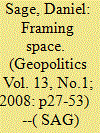|
|
|
Sort Order |
|
|
|
Items / Page
|
|
|
|
|
|
|
| Srl | Item |
| 1 |
ID:
081554


|
|
|
|
|
| Publication |
2008.
|
| Summary/Abstract |
This paper examines how 'ways of seeing' landscape, as practised within the little-known American astronomical art community, can be used to examine the popular geopolitical scripting of an American manifest destiny in outer space. A significant body of work in critical geopolitics has sought to recognise the way in which culturally manifest representations of space and place, together with embedded visual practices, can reproduce and elucidate the construction of geographical imaginations. Despite this, cultural representations of outer space have frequently been overlooked in readings of American popular, geopolitical discourse and associated geographical understandings. As a response to this lacuna, this paper interrogates how visual motifs of an American manifest destiny, developed in nineteenth-century American romanticism, have been mobilised through American astronomical art to explain and popularise conceptions of outer space that invite American human space exploration. By way of conclusion, the paper stresses how the inscription of outer space under the rubric of an American manifest destiny continues to frame the way in which the American space programme, and by extension American geopolitical and geographical imaginations, can be understood today
|
|
|
|
|
|
|
|
|
|
|
|
|
|
|
|
| 2 |
ID:
165563


|
|
|
|
|
| Summary/Abstract |
Labour's 2017 general election manifesto contained a pledge to ‘end the punitive sanctions regime’ in the British welfare state. Whilst the specific implications of this pledge were not elaborated, such a policy would nevertheless constitute a profound break with a welfare consensus spanning over twenty years. The depth of the suggested changes on welfare are also evident in the scale of reform proposed to disability benefits, as well as plans—confirmed in August 2018 by the Shadow Chancellor John McDonnell—to pilot universal basic income. Collectively, these policies would seemingly be deeply at odds with public opinion on the benefits system, which over the course of the last two decades has significantly hardened. Yet despite the seemingly radical and controversial nature of the policy, it received very little media or public attention during the election campaign. This article explores Labour's ‘quiet revolution’ on welfare, examining whether Labour's new welfare approach is indeed a bold attempt to reshape public opinion on welfare or, alternatively, a mostly pragmatic reaction to changing social attitudes. The argument presented is that whilst there are persuasive explanations that Labour is responding to a change in the public mood, there is also evidence of a more ambitious goal at stake: the aim of reshaping, not simply responding to, public opinion on the welfare state.
|
|
|
|
|
|
|
|
|
|
|
|
|
|
|
|
|
|
|
|
|